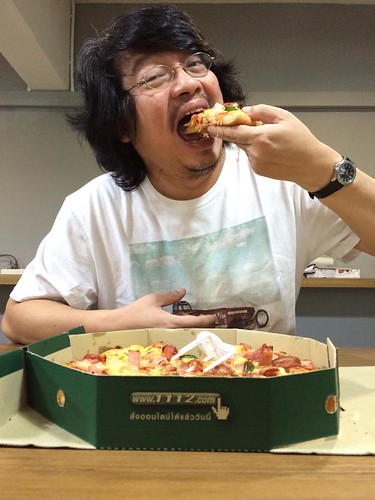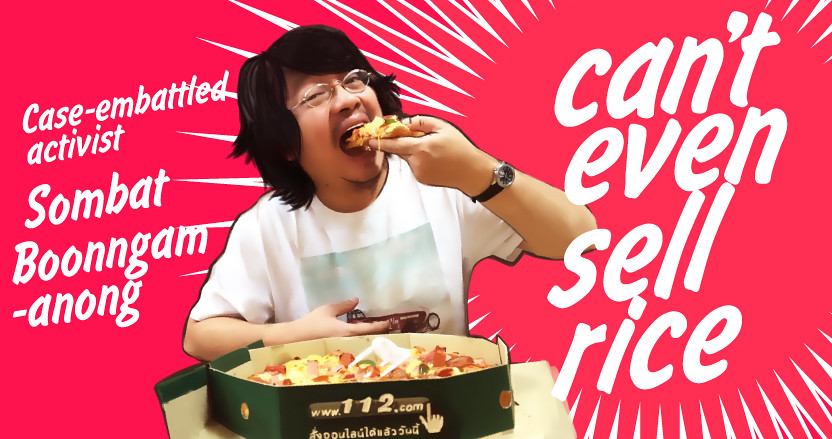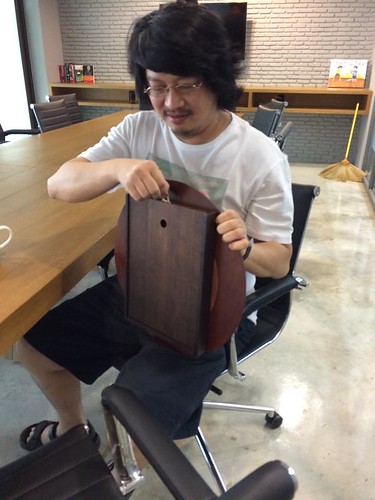Sombat Boonngam-anong, aka Nuling or the Polka Dot Editor, has been all over the news during the past month since he has been forced to take his brand of bagged rice, Polka Dot Rice, off the shelves.
Sales of Sombat’s Polka Dot Rice have been cancelled for violating regulations by not displaying the production and expiration date on the label. Officials will bring Sombat in for further investigation and prosecution at Don Mueang District Court, Government Complex, Building A on 24 June at around 3 pm.
The case against Polka Dot Rice is the latest in a long line against Sombat, who now has four major cases against him. On 22 June, he met the public prosecutor over accusations of violating Article 112 of the Criminal Code, or the lèse majesté law. The public prosecutor’s office has not decided to file the case yet and will investigate further by interrogating six more people.
“I’m confident that the cases against me are politically motivated,” states Sombat.
Sombat is often seen as an artistic freedom fighter who uses symbolism, activities, and light touches of humor to protest. His methods usually appeal most to middle-class supporters. Sombat has had numerous cases against him since 2010, when he led a sit-down protest at Ratchaprasong Intersection to mourn those killed in the 2010 red-shirt protests.
Sombat broke State of Emergency regulations twice during the coup. He organized a “Bare for Life” activity as well as a news-exchange gathering in Khan Na Yao district in northeastern Bangkok. For these gatherings, he was hit with two charges. For the first, Sombat was sentenced to a year in jail, which is still currently suspended. The second case has been dismissed.
The cases he has received since the 2014 coup are as follows:
The first case is for refusing to report to the National Council for Peace and Order (NCPO) after their summons. This case has just completed the process of trying six witnesses at Taling Chan District Court. Luckily, Sombat has not been called to a military court after his widely-publicized arrest at Chonburi.
“The maximum jail term for this offense is two years and a 40,000 baht fine. Luckily, I can fight it in three courts. The story is, I was laying around my house when they summoned me to report to the NCPO. I didn’t go. They got mad and held me captive against my will in a military camp on account of disobeying their orders. I think it’s unfair that I have to follow the orders of someone who’s violated Article 113 of the Criminal Code. The 1997 and 2007 constitutions uphold Article 113, so I had some ground to defend myself. My act of protest is simply not reporting when summoned by a lawbreaker. Not showing up when summoned—that’s my act of civil disobedience.” Sombat said all this in his trademark dazed look.
The second case against Sombat is for posting Facebook comments that are alleged to violate Article 116 of the Criminal Code for inciting rebellion and the Computer Crime Act. This case is within the jurisdiction of the military court and is currently under investigation.
“I was on Facebook, using it to criticize the junta. I was doing this way before the coup, and didn’t encounter any problems for doing so. It became a problem only after the coup.”
“They accused a lot of my Facebook posts of breaking Article 116 of the Criminal Code, such as the one where I said that citizens could be punished for anything, while the NCPO could get away with anything.”
The third case against Sombat is for breaking the lèse majesté law or Article 112 of the Criminal Code and the Computer Crime Act. The accuser is “iPad,” from Roi Et, who filed a complaint against Sombat for posting a parody picture of the People’s Democratic Reform Committee (PDRC) on Facebook that had been sent to him through the Line messaging application. The doctored image is of Suthep Thaugsuban, the PDRC leader, and his wife at a press conference, but with a framed Democrat Party seal in the background instead of photos of the King and Queen.

“Around that time, Suthep had declared that the PDRC was independent. I shared the picture forwarded to me through Line on Facebook without adding any further comment. Thaworn Senneam (the then deputy chief of the Democrat Party), was furious. He gave speeches at Ratchadamnoen Avenue about how I was posting outright slander. The police weren’t even going to process the case against me because it wasn’t even related to the [royal] institution; it was just a parody picture of the PDRC. The police closed this case even before it began. Later, when I got hit with the case for disobeying the NCPO summons, this case was dug up, so I got hit with breaking the lèse majesté law. As of now, that parody picture is still on Pantip (online forums). Fortunately, though, I was granted bail after the EU held a press conference on political prisoners.”
“If I get hit with the maximum sentences on all of these cases, I’d die in prison.”
How did you come to start selling Polka Dot Rice?
“At that time, the NCPO had just frozen my bank accounts, so I could not work. I was the president of four foundations, and I had to quit all of them. I was hosting TV shows on the Peace TV channel, which used to be the UDD Channel, as well as Channel 11 news programmes before having to quit. I tried to transfer jobs and host programmes on Peace TV. I thought I would get to work at least five days, but it only lasted one day when the junta shut Peace TV down. I thought I would find some extra income by selling watches. After a while, I started selling Polka Dot Rice as well.”
“I wanted to start a social enterprise business, a kind of business that would benefit the community. The idea behind Polka Dot Rice was that a kwian of rice [200 litres] is 15,000 baht, so what should an appropriate price be for just putting this rice into packaged bags?”
After you announced that you were going to sell Polka Dot Rice, were you hit with any charges?
“Twenty days after selling rice I started to get harassed. The police came and searched a shop that stocked only 20 bags of my rice. The first time, they just came to talk. The second time, the shop owner started to get scared about these 20 bags, and whether there was anything in them to be worried about. He stopped selling my rice and even shut down his entire shop out of intense fear.”
“Next, the police went to the rice mill at Pathum Thani that provides me with rice. The rice mill didn’t even know that they were my provider because my farmer friend is actually the one who sells the rice to me. So, when the police asked the mill operators about Polka Dot Rice, they were completely oblivious. My farmer friend was there, and told me the story later. Then the Ministry of Commerce called the mill to keep asking about providing rice to Polka Dot Rice. Imagine, the Ministry of Commerce getting so worked up about my rice that they called the mill! That’s not all. At the meeting of the Organization of Bagged Rice Businesses, traders discussed Polka Dot Rice, too. They asked everyone whether anyone was providing rice to Polka Dot Rice. They were really searching for whoever they suspected could be my provider.”
Sombat, also a clock salesman
“Furthermore, the police even searched the house of one of the farmers who sold rice to me. They chose him to search on account of his property having barns and warehouses, therefore having the capacity to store rice. The police wanted to find grounds that Polka Dot Rice was a political project with politically-motivated funding. You can just listen to the tone of Prayut or Col Sansern Keawkamnerd (NCPO spokesman) when they comment on this issue to see that they hypothesize that production of Polka Dot Rice is politically motivated, and that thousands, tens of thousands of bags of rice must exist.”
“But try as they might, they can’t find them. They’ve been trying for so long but to no avail, because those bags don’t exist. I produce 200 bags at a time. The only reason Polka Dot Rice is famous is due to the NCPO’s involvement. After Sansern’s comment, orders for my rice shot through the roof, and I couldn’t even keep up production and delivery. There are two people working in production, packing the bought rice into bags.
“They were fiercely disappointed at not being able to find anything, so they filed as many charges against me as they could. The Consumer Protection Act referred to the Committee on Bagged Rice Labels policies to trip me up. They said that my rice didn’t specify on the packaging on how to cook my rice. Bagged rice from a factory must specify cooking instructions on the label, they said. I’m like, sure, cooking rice for Thai people must be so hard. Fine, according to the law I should print this. That’s fine by me. The issue I take, however, is the fact that this law only applies to rice from a factory. Polka Dot Rice does not come from a factory. By law, a production enterprise needs at least seven workers and a 15 horsepower machine to be categorized as a factory. Polka Dot Rice uses only two people as labour. Even the provincial industry inspector came by, inspected, and declared that my production could not be categorized as a factory.”
“Another issue is the Food Act regarding packaging. They’re accusing me on the grounds that the packaging of my rice doesn’t state the production and expiration dates, or something like that. I have discussed with the Food and Drug Administration as well as inspected other bagged rice brands in the supermarket. Some market brands don’t even provide this information on the packaging either.”
Did you intend to act politically through selling rice? What were your intentions with Polka Dot Rice in the beginning?
“I thought about how the previous government allegedly lost money from selling rice at 15,000 baht. I wanted to take apart this equation and put the numbers to the test: if I sold rice from the market price of 15,000 without tax, would I lose money, too? I wanted to try this out in the form of a social enterprise, and to see if I would sell any rice at all. But to be honest, I also really needed work and a source of income.”
“I wasn’t really thinking too seriously about the project, to be honest. If my rice sold, then good. If not, then never mind. I was just experimenting in case I struck a profit.”
Do you work with a big network of red-shirt farmers?
“I work with a group of red-shirt farmers. They think that Polka Dot Rice, first, is built to protect Yingluck and the rice subsidy scheme. I don’t think of it as direct protection. I just wanted to prove the idea that it is possible to buy rice from farmers at a price that is higher than the market price. The market price of rice is set by merchants, not by consumers or farmers. By buying from farmers at a price higher than the market price, I could then prove that the model of the rice market could be changed.”
“But my farmers see Polka Dot Rice as absolving Yingluck of the charges of the National Anti-Corruption Commission (NACC) and the Ministry of Finance, and calling the so-called failure of the rice scheme into question. This is their point of view, though. Personally, I don’t want to absolve Yingluck. I want to be able to sell rice without taxpayers’ money, so I’m not doing the same thing that Yingluck’s administration did.”
“Second, the farmers also see Polka Dot Rice as challenging the current junta. This junta does not have an aid organization in place for rice farmers. You can see from Col Sansern Keawkamnerd’s rhetoric and tone regarding my rice. He said that if Polka Dot Rice was so good at selling small amounts of rice, why didn’t we just buy all the rice from all the farmers? His words shows that this junta sees me as a challenger, an opponent.”
“To be frank, before Sansern’s PR, I sold 200 bags a day. After he talked publicly about Polka Dot Rice for two straight days, followed by Prayut, my sales jumped to 600 per day. I had more orders than I could keep up with; the maximum number of bags I can produce in one day is 600. Finally, the junta halted my production because they feared I was inciting a farmers’ mob. It seems likely that I will be accused of more cases, too.”
What’s the real reason the junta halted production of Polka Dot Rice?
“I would assume that the junta, as the state, thought that they had no other option than to stop my production. If they let me keep producing Polka Dot Rice, then my sales would keep increasing along with my ideological trend. I can see how they really thought they had no other choice.”
“I had the chance to speak to the military officer in charge of me, who made me see that the junta saw my actions differently from how I did. I saw Polka Dot Rice as a way for me to make money as well as express a bit of playfulness. The junta, though, weren’t amused, and soon I wasn’t either. They wanted to find an exit strategy, a solution for both sides. If I thought that selling rice would actually cause pandemonium, then I would be willing to stop selling Polka Dot Rice, too.”
Did you get a lot of profit from Polka Dot Rice? Does the social enterprise business model really work?
“I thought I would get super rich, like the guy who did the Tao Kae seaweed brand (laughs). I was just following the equation I told you about before. I started out by buying 70 kwian of rice in the first month, with a goal of selling just 15. I thought it would be a really slow business. After selling a certain amount though, I got lots of new ideas about the business, such as how I could really enter the mainstream market. I saw many opportunities and I even believed that I could make Polka Dot Rice even more widespread than 7-11 if there was no one standing in my way. That might be a bit of an exaggeration, though.”
Besides the conflicts with the junta, Polka Dot Rice has also run into opposition among Red Shirts.
“It really shouldn’t be that way. I’ve never opposed their E-Rice project at all. They created another ethically sound model, just a different one from mine. Polka Dot Rice focuses on the rice market, and has a delivery system in place. People in charge of delivery get extra income from me, more than they get from large rice corporations. They get 25 baht per bag from me, but most rice deliverers get 10 baht per bag. The E-Rice project, on the other hand, uses a deposit system where whoever has an available vehicle delivers the rice. To me, this system seems to have some limitations.”
It seems that due to your rice selling, now you’re prevented from doing anything else.
“Yes, it’s really difficult to do anything at all. Once, I went to deliver clocks to Ayutthaya. A customer had ordered a big lot of 12 clocks. I drove there to deliver the clocks myself. The Special Branch Police were trailing me. I had made plans to stay over in Ayutthaya for a night, and the police booked the same resort as I did. They were following me, I’m 10,000 per cent sure of it. They probably thought I was going to meet up with some core red-shirt leaders to incite some farmers into rebellion or something, I guess. But of course there was no such meeting. Everyone knew I was going to deliver clocks in Ayutthaya; I even posted a Facebook comment about it.”
How are you living your daily life, with all these cases against you and the arrests?
“It’s not a normal life, and one that’s far from being happy or free. I might be in the 1 per cent that insists that we are not living under a democratic system. I have to ponder really hard before doing any simple, everyday thing. For example, my friend invited me to go eat with him at McDonald’s, as a casual hang out. I thought really hard about if I should go. If there were police eating there too, would they accuse me of trying to incite unrest? The other day, I went to True Coffee after delivering clocks at the Government Complex, and was sitting here chatting with a friend. Suddenly a soldier just came up to me and took pictures while we were drinking coffee. I was completely bewildered.”
The story is originally published in Thai on Prachatai and was translated into English by Asaree Thaitrakulpanich






